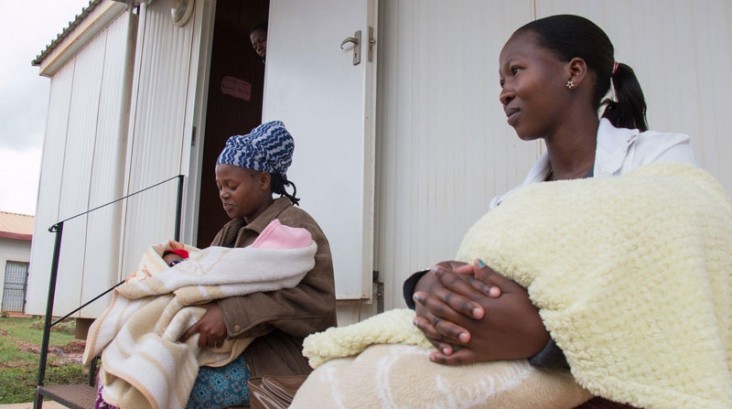- What We Do
- Agriculture and Food Security
- Democracy, Human Rights and Governance
- Economic Growth and Trade
- Education
- Ending Extreme Poverty
- Environment and Global Climate Change
- Gender Equality and Women's Empowerment
- Global Health
- Water and Sanitation
- Working in Crises and Conflict
- U.S. Global Development Lab

The U.S. Agency for International Development (USAID) announced the launch of a new study, known as ADVANCE, in Johannesburg, South Africa, on January 16, 2017. The ADVANCE study, led by Wits Reproductive Health and HIV Institute (Wits RHI) is co-funded by USAID, the U.S. President's Emergency Plan for AIDS Relief (PEPFAR) and UNITAID. USAID’s investments in ADVANCE are part of its support for the OPTIMIZE consortium, a global partnership working to accelerate access to simpler, safer and more affordable HIV treatment.
ADVANCE is designed to generate evidence to replace the current standard of care for first-line HIV treatment with a fixed-dose regimen of two antriretroviral medications, dolutegravir (DTG) and tenofavir alafenamide (TAF). DTG and TAF have demonstrated improved safety, better patient tolerability, a higher resistance barrier and reduced costs – all of which are critical to achieving the global goal of creating an AIDS-free generation.
“If successful, patients will benefit from a much safer and more forgiving drug regimen in a smaller tablet,” said Professor Francois Venter, Wits RHI’s Deputy Director and Principal Investigator for the ADVANCE study.
Currently, South Africa has the largest antiretroviral therapy (ART) program in the world, owing in part to recent changes in ART initiation guidelines with the National Department of Health’s adoption of the World Health Organization’s (WHO’s) “Treat All” in September 2016. Based on these “Treat All” guidelines, which contain key recommendations to treat all people living with HIV — including children, adolescents, adults, pregnant and breastfeeding women, and people with co-infections — South Africa’s current approach aims to advance overall life expectancy in patients on ART and help achieve the global 90-90-90 targets.
This expansion of treatment under “Treat All” also means that South Africa’s ART budget must accommodate millions of people for several decades of life moving forward. Recent scientific articles point out that a switch to a DTG/TAF-based regimen could enable South Africa to treat all people living with HIV in the country by 2019 with its current level of antiretroviral treatment budget. Thus, DTG and TAF have been hailed as potential game-changers for meeting the increased demand for HIV treatment given their potential for cutting costs (recent modeling by CHAI suggests new ARVs could represent over US$ 3 billion in cumulative cost-savings by 2025) and increasing patient benefits.
“While the global coordination required to introduce new combinations like DTG/TAF can be daunting, the start-up of ADVANCE shows how a dedicated group of stakeholders can make this challenging work a reality. We at USAID are excited to be a part of such an effort, given the enormous potential of DTG and TAF to improve outcomes for patients and programs,” said Benny Kottiri, USAID’s Office of HIV and AIDS Research Division Chief.
The ADVANCE study will enroll 1,100 participants at three research sites within the Johannesburg Central Business District and includes the evaluation of participants in vulnerable populations, adolescents, pregnant women, and those with tuberculosis and hepatitis B co-infections, establishing the benefit of these new drugs in real world conditions faced by many low- and middle-income countries. Wits RHI’s research teams began screening eligible participants at the three clinics on January 16, 2017.
Since its inception, the ADVANCE study has been developed through extensive collaboration by a broad range of scientific partners, drug companies, donors, research affiliates and advocacy groups within the local and global arenas. USAID is proud to partner with this diverse group of stakeholders on harmonizing ART optimization efforts through its support for the Wits RHI-led OPTIMIZE consortium. This innovative, South African-led consortium brings together a diverse set of partners – including ICAP at Columbia University‚ Mylan Laboratories‚ the University of Liverpool and the Medicines Patent Pool – to leverage expertise in research, manufacturing, market access, program implementation and advocate engagement. The OPTIMIZE consortium’s ability to work with partners on a wide range of approaches to accelerating access to simpler, safer and more affordable HIV treatment – from generating missing clinical trial data needed to achieve regulatory approval, to reducing manufacturing costs, and accelerating product introduction in developing countries – represents USAID’s commitment to supporting innovative solutions to address challenging development problems.
USAID, through PEPFAR, is proud to co-fund the ADVANCE study with UNITAID and to support OPTIMIZE, a global partnership unifying distinct voices to achieve a common goal: accelerating access to simpler, safer and more affordable HIV treatment. Learn more.
Additional Resources
- “ADVANCE Study” – Study launched to test new and safer HIV drugs [PDF, 246KB]
- ADVANCE Trial Fact Sheet [PDF, 3.8MB]
- ADVANCE: Stretching Development Dollars and Improving HIV Treatment
- Better‚ safer‚ cheaper: the new HIV treatment about to undergo full-scale tests in SA
- Cutting the cost of South African antiretroviral therapy using newer, safer drugs
- SA organizations chosen to address HIV and AIDS globally







Comment
Make a general inquiry or suggest an improvement.